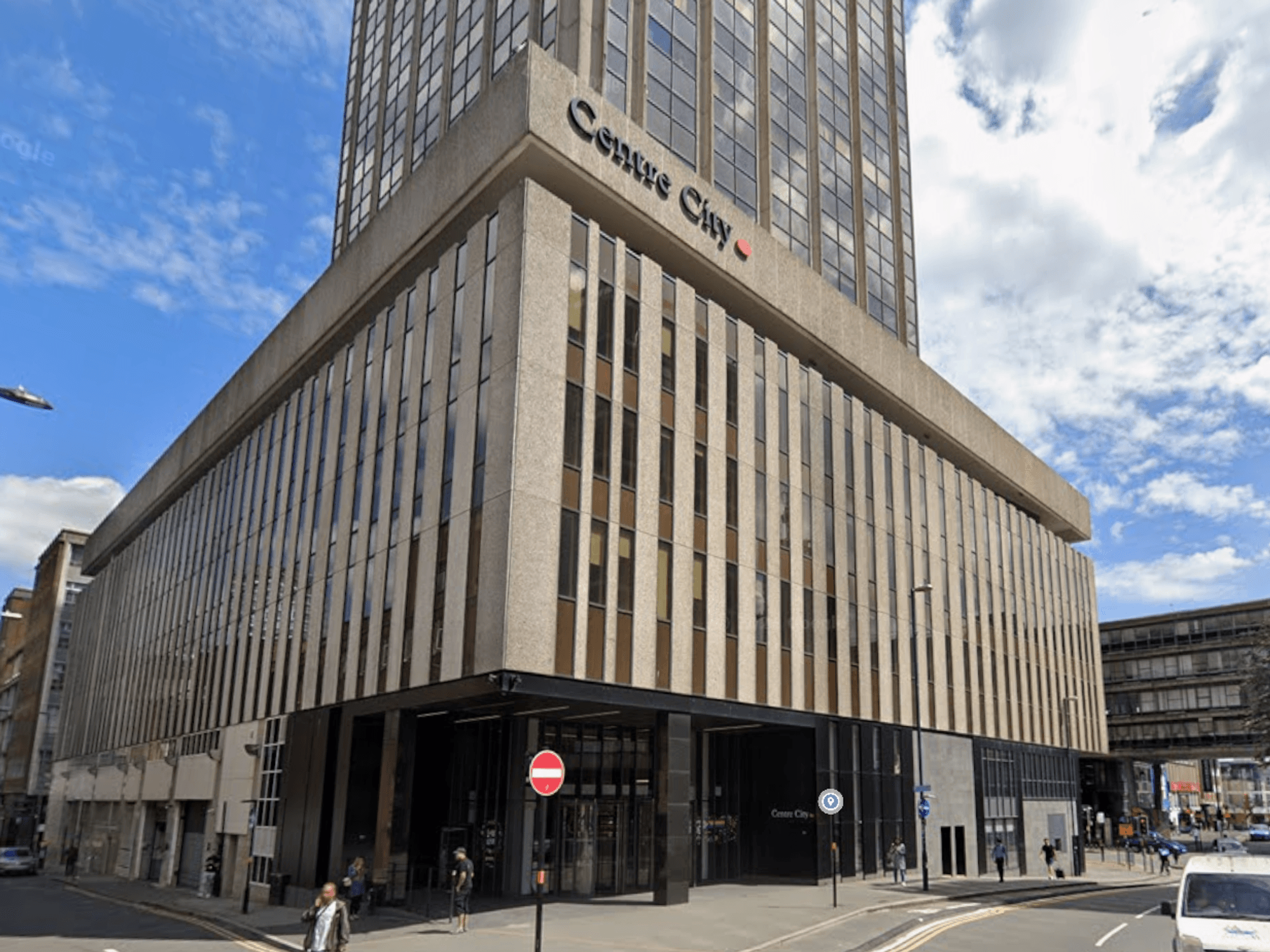REVEALED: Inside EU’s migration plot to restore free movement through the back door in shock Brexit betrayal

Gareth Davies MP isn't in favour of Labour's proposed youth mobility scheme, which could temporarily let young Europeans into the country. |
GB NEWS

Sir Keir Starmer will meet European leaders on May 19 to discuss how to 'reset' cross-Channel relations, including on migration
Don't Miss
Most Read
Latest
The European Union’s proposal to create a Youth Mobility scheme with the UK risks restoring free movement in all but name, a shocking Brussels document has revealed.
Sir Keir Starmer’s Government is locked in negotiations with Brussels bureaucrats as part of the Prime Minister’s relationship “reset”, with fishing and dynamic alignment also being put on the table.
Despite Europe Minister Nick Thomas-Symonds declaring the UK will only accept a “sensible”, “smart” and “controlled” scheme, Brussels’s initial proposal demanded that those aged 18 to 30 should not need a purpose to enter the UK or adhere to a strict quota.
In its proposal, penned in April 2024, the European Commission said: “The proposal sets out the conditions that would have to be met (age, maximum duration of stay, conditions of eligibility, rules for verifying their compliance) to enable young people to move without being tied to a purpose (ie to allow for studying, training or working), or quota-bound.

Ursula von der Leyen
|GETTY
“For instance, under the envisaged agreement, both EU and UK citizens aged between 18 and 30 years would be able to stay for up to four years in the destination country.”
While stopping short of proposing an indefinite migration arrangement, the EU’s initial suggestion appears to enable an unlimited number of arrivals under the pretence they only stay for four years and meet the conditions of residency.
Brussels suggested valid travel documentation, sickness insurance, proof of sufficient means of subsistence would all constitute general conditions for admission.
At the time of the European Commission’s proposal, top Brussels bureaucrat Maros Sefcovic said: “The United Kingdom’s withdrawal from the European Union has hit young people in the EU and the UK who would like to study, work and live abroad particularly hard.
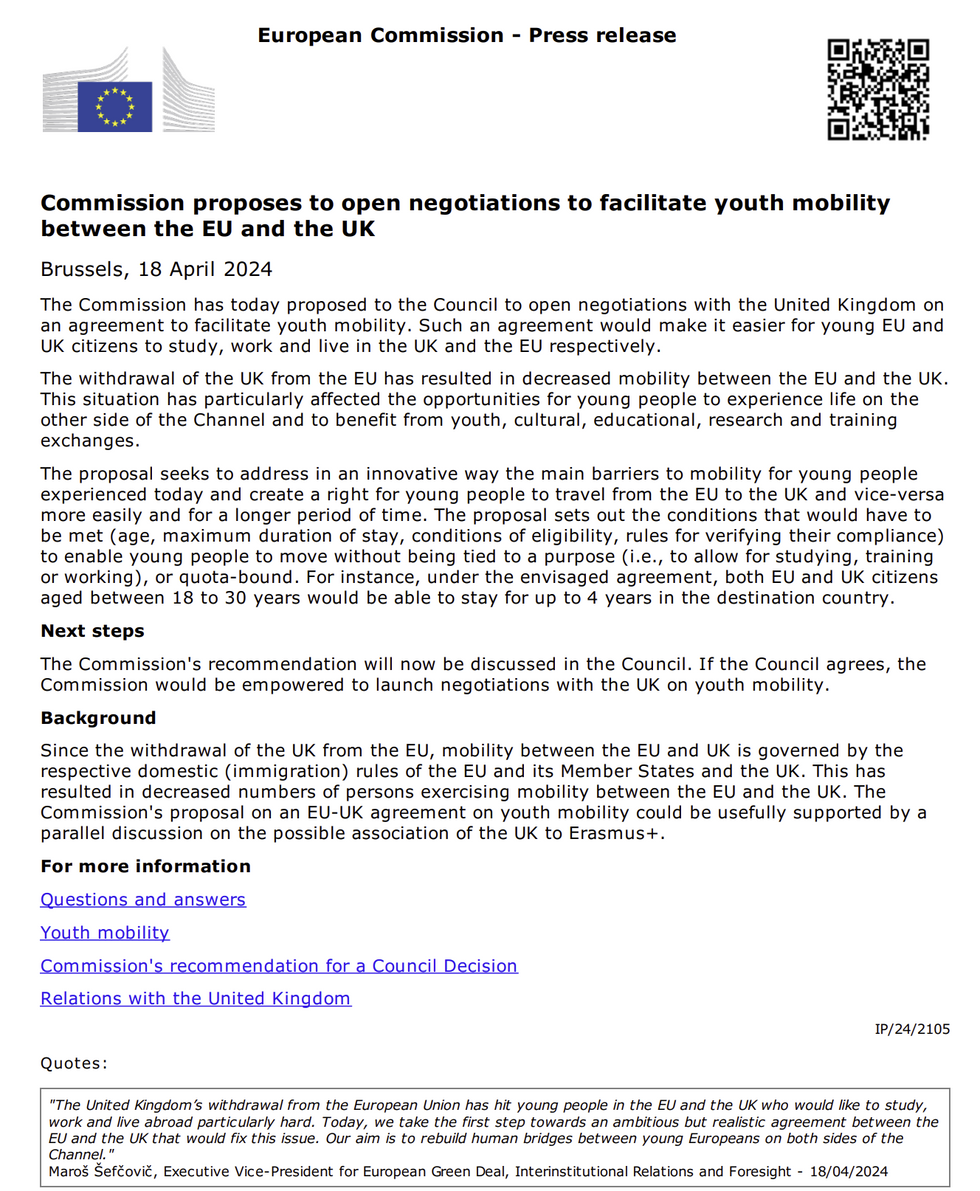 The European Commission put forward its proposal last April | EUROPEAN COMMISSION
The European Commission put forward its proposal last April | EUROPEAN COMMISSION“Today, we take the first step towards an ambitious but realistic agreement between the EU and the UK would fix this issue. Our aim is to rebuild human bridges between young Europeans on both sides of the Channel.”
However, the UK Government is keen not to get drawn into the EU’s overall negotiating position.
The EU confirmed the UK - under Rishi Sunak - had already approached a number of EU member states about country-by-country Youth Mobility schemes.
“In the course of 2023,” a Brussels document confirmed, “the United Kingdom approached several (but not all) Member States with the intention of negotiating arrangements on Youth Mobility, modelled upon the United Kingdom’s Youth Mobility visa scheme.”
Dismissing the workability of such arrangements, the European Commission added: “This approach would result in differential treatment of Union nationals. In addition, this approach would not address the main barriers to mobility experienced by young people since the end of the transition period.”
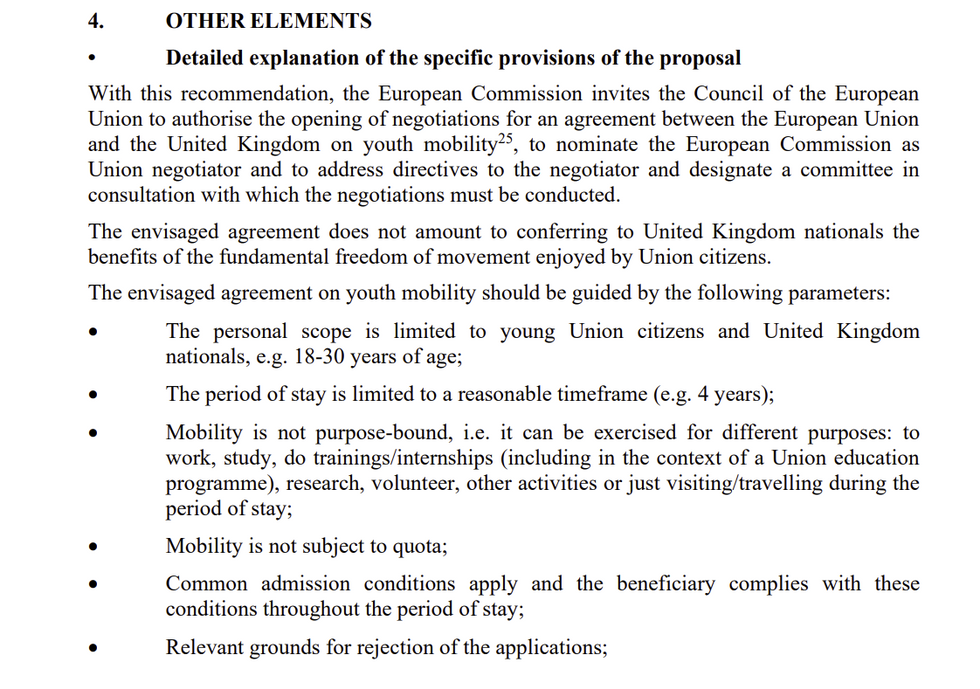 The European Commission's proposal is clear about not being subject to a quota | EUROPEAN COMMISSION
The European Commission's proposal is clear about not being subject to a quota | EUROPEAN COMMISSIONThe UK had reportedly approached several member states of similar economic stature - including France, Spain and Sweden.
But Thomas-Symonds is now adamant that the UK will only accept a “sensible” proposal from Brussels.
He told The Financial Times: “We will consider sensible EU proposals in this space.”
Thomas-Symonds added that the Government’s red lines of “a smart, controlled youth mobility scheme would of course have benefits for our young people” must be respected.
The Prime Minister’s official spokesman also echoed Thomas-Symonds’s recent pivot, saying that the Government is “always open to listening to sensible proposals from the EU within the framework of bringing down net migration”.
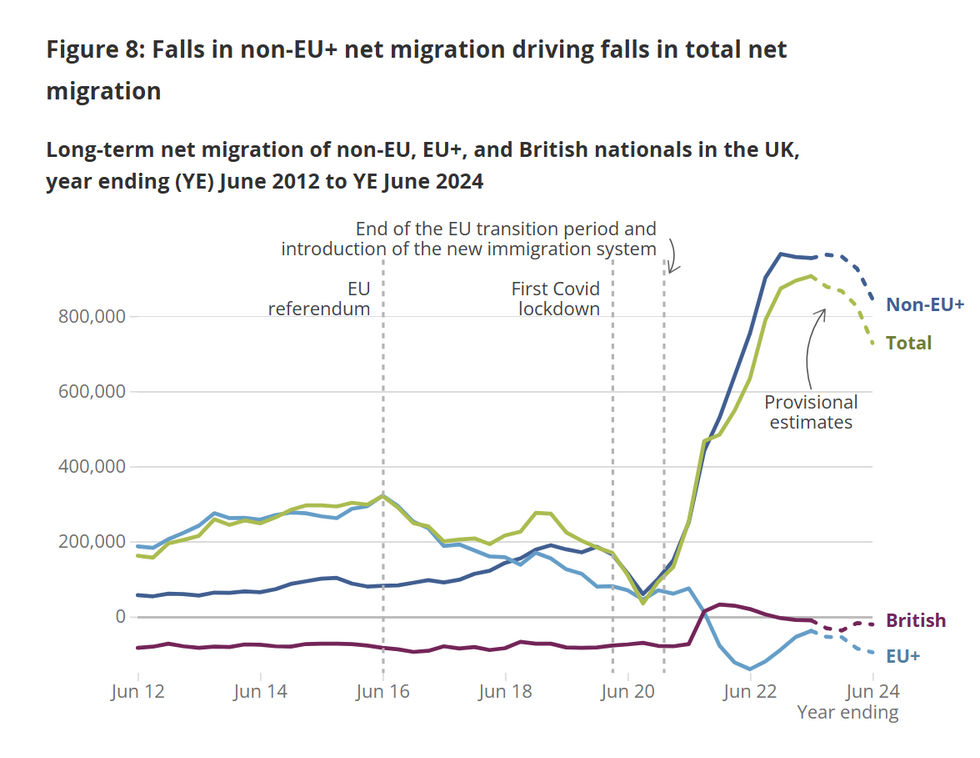 Net migration among EU nationals fell after the UK left the Brussels bloc | ONS
Net migration among EU nationals fell after the UK left the Brussels bloc | ONS“I’m not going to get into a running commentary,” the spokesman said, adding: “These talks are ongoing.”
Sources close to the UK’s negotiating team have reportedly set their sights on striking an accord more in line with the one given to Australia.
Despite setting out the UK’s position, there are growing concerns about Starmer buckling to Brussels - with the Prime Minister already being slammed for concessions handed to India, the United States and Mauritius.
And the EU is still pushing for a looser migration arrangement with Britain.
In a leaked document shared with the FT, Brussels is still demanding a “dedicated visa” to enable young people to work, study or “simply travel” in the UK as long as they have sufficient funds.
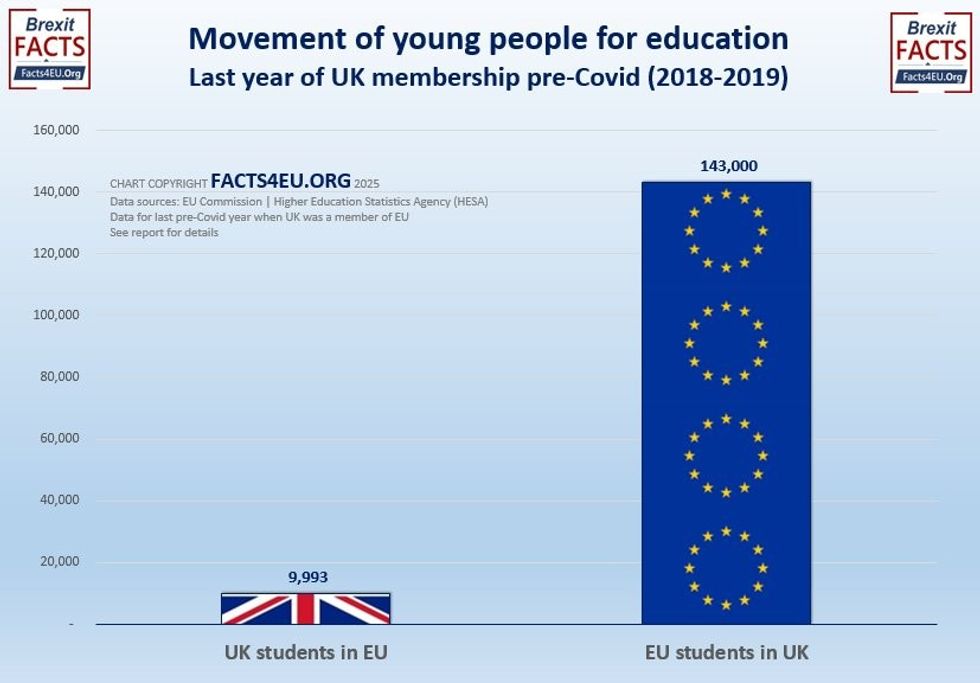 Youth Mobility Scheme could reflect the Erasmus+ programme | FACTS4EU
Youth Mobility Scheme could reflect the Erasmus+ programme | FACTS4EUIt also proposes that EU students should return to paying the same £9,535 fees to attend British universities as home students.
However, recent research shared with GB News showed how the Erasmus+ scheme resulted in a one-way surge, enabling 143,000 EU students to settle in the UK with less than 10,000 British students heading the other way.
The UK is instead pushing for a “time-limited [and] capped” deal that would mean visitors had “no right to bring dependants or access benefits”.
The fury comes after GB News revealed that roughly three-in-five of all EU nationals registering to enter the workforce between 2012 and 2024 were under 30-years-old.
The figure peaked at 65 per cent in 2012/13, with a Covid-era slump down to 48 per cent in 2020/21.
A post-lockdown bounce back up to 63 per cent in 2023/24 ultimately puts the proportion of EU arrivals falling within the Youth Mobility Scheme age range back in kilter with the UK’s pre-Brexit figures.
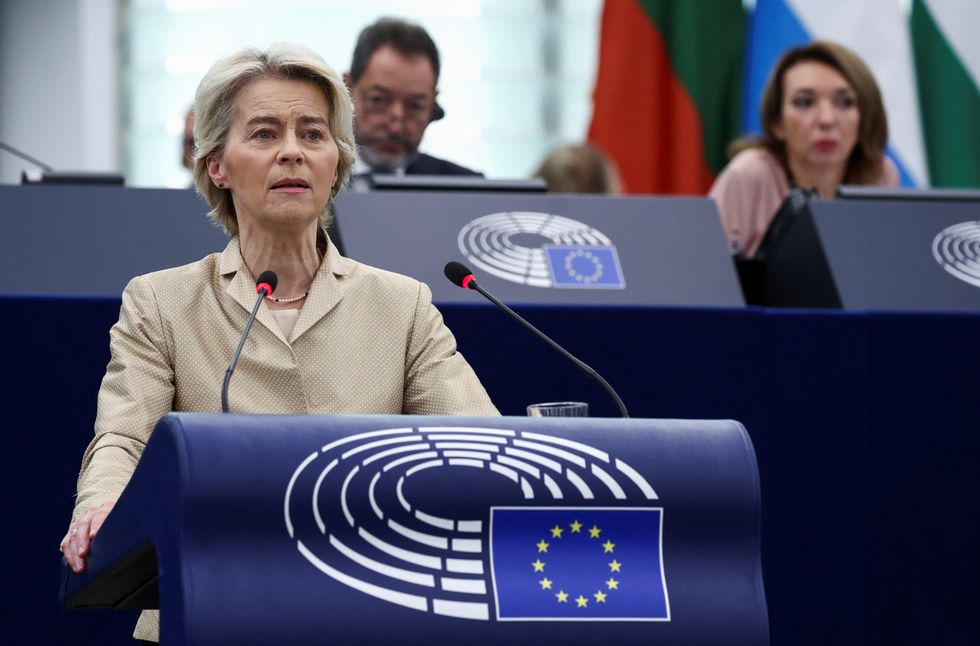
Ursula von der Leyen
| ReutersHowever, Cambridge University’s European law professor Catherine Barnard has also dismissed the notion that the EU’s proposal is a restoration of free movement.
Writing for UK in a Changing Europe last May, Professor Barnard said: “The proposal falls far short of free movement because it only allows individuals to come for a limited period and does not allow them to settle in the UK or EU member state.
“It builds on national youth mobility schemes (YMS) (eg France has agreements with 16 countries).
“The UK has 13 YMSs, including with Australia, New Zealand, Andorra and Uruguay (with an application fee of £298 and the annual health care surcharge of £776).”
In its proposal, the European Commission also dismissed concerns the proposal would restore free movement.
"The envisaged agreement would provide for limited-in-time mobility, subject to the fulfilment of conditions to be checked before the mobility can take place," it said. "The conditions should also be met during the stay. It is not about conferring to young UK nationals the benefits of the fundamental freedom of movement enjoyed by EU citizens. At the time when the UK was a Member State, UK nationals had the right to move and reside freely within the EU. This is not reinstated."





